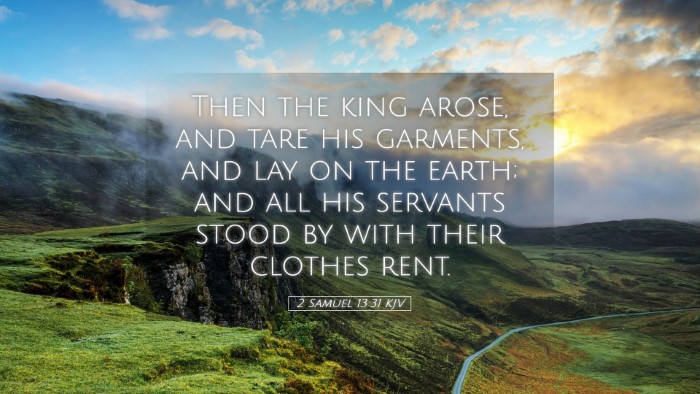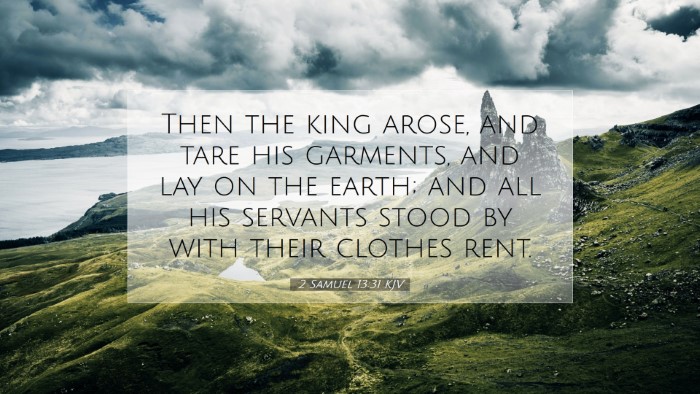Bible Commentary on 2 Samuel 13:31
Verse Context: 2 Samuel 13:31 states: "Then the king arose and tore his garments and lay on the earth; and all his servants stood by with their clothes torn." This verse comes in a grieving moment as King David reacts to the shocking news of his son Amnon's death, executed by his other son Absalom.
Overview and Analysis
The context of this verse is steeped in tragedy and betrayal within King David's family. Amnon, David's firstborn son, had committed a grievous act against his half-sister Tamar, which culminated in a plot led by Absalom to avenge her honor. David's reaction encapsulates a profound sense of loss, illustrating the deep emotional turbulence present in this royal household.
Matthew Henry's Commentary
Matthew Henry notes that David's tearing of garments is a traditional expression of grief and mourning in Jewish culture. This physical act symbolizes both a personal loss and the unraveling of familial bonds. He remarks, "David mourned not only for Amnon’s death but also for the consequences that followed which would further rip the fabric of his family."
- Emotion of Grief: David's grief was compounded by the realization of his own failure as a father in allowing such discord to arise within his family.
- Public and Private Mourning: The tearing of garments was a public declaration of sorrow, suggesting that David understood the implications of Amnon’s death extended beyond private family loss to a national crisis.
Albert Barnes' Commentary
Albert Barnes emphasizes the gravity of the situation by focusing on the king's immediate response to the news. He writes, "The tearing of his garments was a sign that he was overwhelmed, perhaps indicating a breaking point in his leadership." Barnes further examines the impact of this moment on the kingdom:
- Consequences for the Kingdom: The death of Amnon leads to greater strife within David's reign as the kingdom is not just a family, but a community affected by royal discord.
- David's Isolation: Barnes suggests that this episode contributes to David's feeling of isolation as a leader, trapped between the love for his sons and the justice that must be doled out.
Adam Clarke's Commentary
Adam Clarke provides a theological reflection on David's reaction, suggesting that it reflects a larger narrative of divine justice and moral complexity. Clarke asserts, "David's mourning is not only for Amnon's death but for the chaos and sin that has infiltrated his household." His insights lead to several key points:
- The Nature of Leadership: Clarke discusses how leaders bear the weight of their people's choices, hinting that David's failure as a father parallels his failures as a king.
- Divine Retribution: Clarke ties the events to the idea of divine judgment, suggesting that Amnon's death is a reflection of the consequences of sin, both in personal lives and in broader contexts.
Theological Reflections
It is imperative for pastors, students, and scholars to engage with the emotional depth and theological implications of 2 Samuel 13:31. The lament of King David serves as a powerful reminder of the ramifications of sin, particularly within our closest relationships.
- Mourning as a Spiritual Discipline: Engaging in mourning, whether public or private, can be a vital aspect of spiritual health, allowing for the processing of loss and the restoration of relationships.
- Responsibility in Leadership: This passage highlights the deep responsibilities of leaders to maintain justice, not just in their public roles, but within their homes.
- Hope Amidst Grief: Despite the profound sorrow displayed, this narrative ultimately leads to themes of redemption, emphasizing the importance of seeking God’s grace in troubled times.
Conclusion
2 Samuel 13:31 encapsulates a critical moment in the life of King David, unveiling the complexities of familial relationships intertwined with leadership. The commentaries of Matthew Henry, Albert Barnes, and Adam Clarke invite us to reflect on the weight of sin, the nature of grief, and the lessons of responsibility that extend beyond such personal tragedy. For pastors and theologians, it serves as a poignant reminder of the need for compassion, accountability, and a return to the heart of God in times of crisis.


